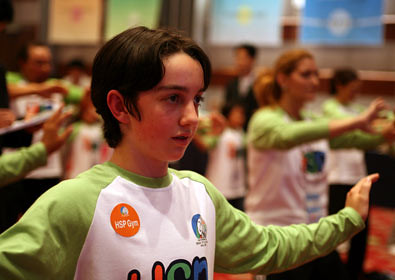
Article by Therese J. Borchard from her blog Beyond Blue.
Today I have the pleasure of interviewing Douglas Eby, M.A./Psychology, who is a writer and researcher on the psychology of creative expression, high ability and personal growth.
He is creator of the Talent Development Resources series of sites (including HighlySensitive.org) at http://talentdevelop.com. I know many of you are "highly sensitive" and enjoy articles on that topic, so I am excited to pique his highly-sensitive brain today!
Question: If you had to name the top five gifts of being highly sensitive, what would they be?
Douglas:
1. Sensory detail
One of the prominent "virtues" of high sensitivity is the richness of sensory detail that life provides. The subtle shades of texture in clothing, and foods when cooking, the sounds of music or even traffic or people talking, fragrances and colors of nature. All of these may be more intense for highly sensitive people.
Of course, people are not simply "sensitive" or "not sensitive" - like other qualities and traits, it's a matter of degree.
Years ago, I took a color discrimination test to work as a photographic technician, making color prints. The manager said I'd scored better, with more subtle distinctions between hues in the test charts, than anyone he had evaluated.
That kind of response to color makes visual experience rich and exciting, and can help visual artists and designers be even more excellent.
2. Nuances in meaning
The trait of high sensitivity also includes a strong tendency to be aware of nuances in meaning, and to be more cautious about taking action, and to more carefully consider options and possible outcomes.
3. Emotional awareness
We also tend to be more aware of our inner emotional states, which can make for richer and more profound creative work as writers, musicians, actors or other artists.
A greater response to pain, discomfort, and physical experience can mean sensitive people have the potential, at least, to take better care of their health.
4. Creativity
Psychologist Elaine Aron, author of The Highly Sensitive Person, estimates about twenty percent of people are highly sensitive, and seventy percent of those are introverted, which is a trait that can also encourage creativity.
As examples, there are many actors who say they are shy, and director Kathryn Bigelow, who recently won an Academy Award, has said, "I'm kind of very shy by nature." The star of her movie The Hurt Locker, Jeremy Renner (who was reportedly shy as a child) has commented that "in social situations she can be painfully shy."
5. Greater empathy
High sensitivity to other people's emotions can be a powerful asset for teachers, managers, therapists and others.
Question: And, if you had to name five curses, what would they be? And how best do we overcome them or co-exist with them?
Douglas:
1. Easily overwhelmed, overstimulated
The biggest challenge in high sensitivity is probably being vulnerable to sensory or emotional overwhelm. Taking in and processing so much information from both inner and outer worlds can be "too much" at times and result in more pain, fatigue, stress, anxiety and other reactions.
An intriguing neuroscience research study I came across that may explain some of this said people with nervous systems having decreased latent inhibition are more open to incoming stimuli. Which can be a good thing, or not so good.
Actor Amy Brenneman once commented, "I'm too sensitive to watch most of the reality shows. It's so painful for me."
That kind of pain or discomfort can mean we don't choose to experience some things that might actually be fun or enriching. Though I don't mean reality shows.
2. Affected by emotions of others
Another aspect of sensitivity can be reacting to the emotions - and perhaps thoughts - of others. Being in the vicinity of angry people, for example, can be more distressing.
As actor Scarlett Johansson once put it, "Sometimes that awareness is good, and sometimes I wish I wasn't so sensitive."
3. Need lots of space and time to ourselves
We may need to "retreat" and emotionally "refresh" ourselves at times that are not always best for our goals or personal growth. For example, being at a professional development conference, it may not be the most helpful thing to leave a long presentation or workshop in order to recuperate from the emotional intensity of the crowd.
4. Unhealthy perfectionism
There can also be qualities of thinking or analyzing that lead to unhealthy perfectionism, or stressful responses to objects, people or situations that are "too much" or "wrong" for our sensitivities.
5. Living out of sync with our culture
Living in a culture that devalues sensitivity and introversion as much as the U.S. means there are many pressures to be "normal" - meaning extraverted, sociable and outgoing.
Dr. Ted Zeff, author of The Highly Sensitive Person's Survival Guide, points out that other cultures, such as Thailand, have different attitudes, with a strong appreciation of sensitive or introverted people.
Jenna Avery, a "life coach for sensitive souls," counsels people to accept or even pursue being "out of sync" with mainstream society, and be aware of other's judgments of people as too sensitive, too emotional, or too dramatic.
And if we are sensitive, we may use those kinds of judgments against ourselves, and think, as Winona Ryder said she did at one time, "Maybe I'm too sensitive for this world."
Certainly there are extremes of emotions that are considered mood disorders, for example, and should be dealt with as a health challenge.
But "too emotional" or "too sensitive" are usually criticisms based on majority behavior and standards.
Overall, I think being highly sensitive is a trait we can embrace and use to be more creative and aware. But it demands taking care to live strategically, even outside popular values, to avoid overwhelm so we can better nurture our abilities and creative talents.




 he work I do with clients is primarily focused on mapping out, and gaining, a deeper understanding of how an individual processes the world. Together we develop a plan towards building coping mechanisms required to better maintain a healthy equilibrium.
he work I do with clients is primarily focused on mapping out, and gaining, a deeper understanding of how an individual processes the world. Together we develop a plan towards building coping mechanisms required to better maintain a healthy equilibrium.









